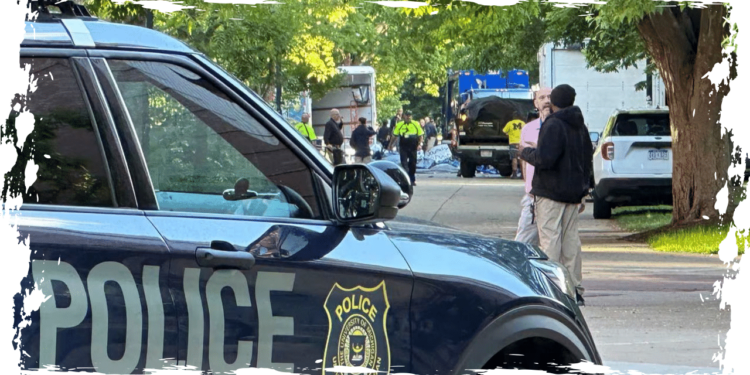Police broke up a pro-Palestinian campsite at the University of Michigan before daybreak Tuesday, alleging a threat to public safety. This comes less than a week after activists increased pressure by dumping fake body bags on a university administrator’s lawn.
Officers wearing helmets and face shields cleared approximately 50 people from the Diag, which has long been a venue for student protests. Online videos showed cops spraying people with what appeared to be an irritant, forcing them to flee.
Four individuals were taken into custody, prompting the demonstrators to relocate to the Washtenaw County jail, where they proceeded to march in solidarity with their comrades.
According to a statement by Ono, the encampment posed a safety threat due to overloaded power sources and open flames. He mentioned that the organizers had failed to comply with requests to make necessary changes following an inspection by a fire marshal.
“The continuous disregard for safety directives is just one of the many concerning incidents surrounding the encampment, which has consistently violated the rules governing the Diag. These rules, especially those that ensure equal access for all, have been consistently ignored,” stated Ono.
Protesters are calling for the school’s endowment to cease investing in companies linked to Israel. However, the university asserts that it does not have any direct investments and has only allocated less than $15 million to funds that may potentially include Israeli companies. This amount accounts for less than 0.1% of the total endowment.
Sarah Hubbard, chair of the Board of Regents, stated unequivocally last week that there is no further discussion to be had on the matter.
On May 15, a gathering of 30 protesters arrived at Hubbard’s residence and placed sheets stained with red dye on her lawn, resembling body bags. In addition to that, they vociferously chanted slogans and beat a drum using a bullhorn.
Other board members were also confronted by individuals wearing face coverings who posted their demands at the doors.
Mark Bernstein, a board member and Detroit-area lawyer, passionately expressed his concerns at a recent Regents meeting about the consequences of failing to address antisemitism. He emphasized that the impact of this inaction can reach alarming levels, even to the point where it directly affects his personal life. Bernstein posed thought-provoking questions, wondering who will be the next target and where this wave of discrimination will eventually cease. Drawing from his own Jewish heritage, he emphasized the importance of learning from history’s tragedies and taking decisive action now. Bernstein’s powerful words serve as a reminder that enough is enough, and the time to combat antisemitism is long overdue.
Tent encampments have been established by students and other individuals on campuses across the country, urging colleges to sever financial connections with Israel. The campus atmosphere has been tense since the autumn due to the ongoing conflict, but protests escalated rapidly after law enforcement cracked down on an encampment at Columbia University on April 18. The number of arrests on campuses nationwide has now exceeded 3,000.
On Monday, Drexel University in Philadelphia issued a warning that it may disperse an encampment on its campus. The situation has led to a lockdown, virtual classes, and increased police presence to monitor the ongoing demonstration.
Drexel employees were instructed to work from home as a result of the encampment. President John Fry expressed his concern about the disruption of campus life caused by the encampment and emphasized that it cannot be allowed to continue.










